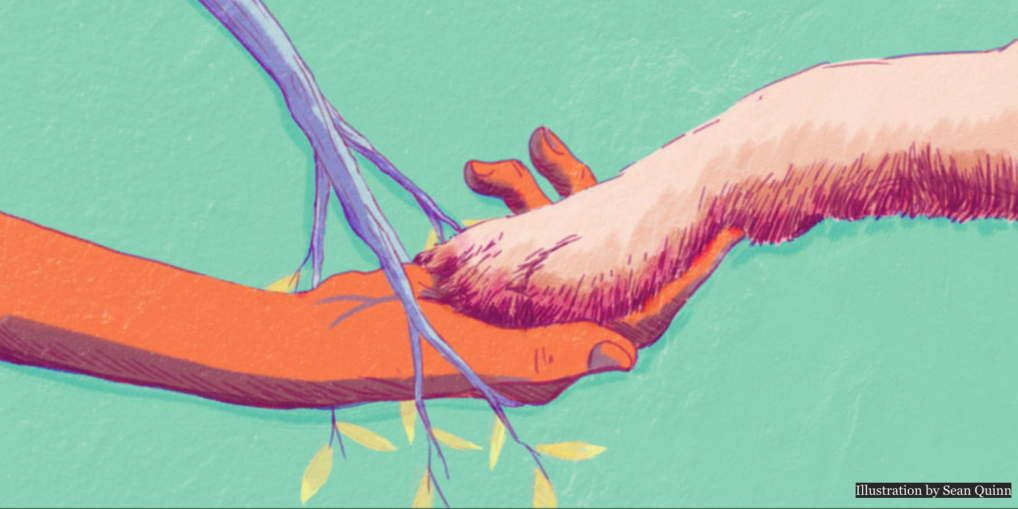To reduce the risk of future pandemics, we need to move from domination to partnership with nature
Welcome to this edition of Firelight: Wisdom to Support & Inspire!
This edition of Firelight is written by Teddie Potter who shares reflections on how we can help health-care professionals fight crises like COVID-19 by changing the way we live and the choices we make.
This Month’s Curator: Teddie Potter is Director of Planetary Health at the University of Minnesota School of Nursing, as well as a leader in the Nurses Drawdown movement. Illustration by Sean Quinn
….
“The universe is made of stories, not of atoms.” – Muriel Rukeyser
People are watching in horror as the COVID-19 pandemic spreads across the globe. Friends frequently ask me, “How can we help? What can we do to support the nurses and doctors?” Because I’m a nurse, they trust that I will know the most effective way they can make a contribution. My usual response is to encourage them to donate any masks or gloves they may have and work to ensure that frontline providers and caregivers have adequate childcare and support. I add that they can help doctors and nurses by staying well and not further burdening a health care system that is already stretched thin.
But my final response always catches them off guard: “We can help nurses and doctors the most by changing the way we live and the choices we make so that pandemics are less likely to happen in the future.”
We have known for quite some time that the burgeoning population of humans coupled with mass consumption of resources is not sustainable. We now know that time is up. We cannot buy our way out of urgent crises including climate change, acidification of our oceans, massive loss of biodiversity and other human-caused disruptions that threaten human health and civilization. We need to act quickly and effectively to alter our current path. But how? I believe the answer lies in shifting our cultural narrative.
Cultural Continuum
We humans like to think of ourselves as rational beings. However, many of our words and actions appear irrational. That is because decisions that guide our choices are frequently based on personal and cultural narratives rather than data. In many cases these narratives are so deeply ingrained in our psyches that we do not recognize them and cannot put a name to them.
Cultural transformation theory, developed by social systems scientist Riane Eisler, posits that human social systems tend to orient on a continuum from domination to partnership.
Domination systems are characterized by rigid hierarchical ranking. Communication is top down, leaders use power to support the status quo, and the structure of the system is maintained with shame, blame and fear. Members tend to pattern their behavior after the leader and bully those they perceive to be of lower rank. There is little innovation because diverse ideas are not tolerated.
In systems of domination, scarcity thinking is pervasive and used by those with power to sow division among the powerless. In a domination paradigm, everything is separate. Some elements or “members” of the system are valued, but most are expendable unless they benefit those at the top.
Partnership systems are on the other end of the continuum. In social systems that orient toward partnership, individuals are respected for their unique abilities and contributions. Diverse ideas and opinions are sought, so there is a high degree of innovation. There is a sense of abundance and greater tendency for collaboration. Communication flows bidirectionally between children and parents, workers and employers, constituents and elected officials.
Partnership systems are not flat; they do have hierarchies of responsibility or “actualization.” The difference between domination and partnership is in the use of power. Leaders in systems of domination use power over others to advantage those with the highest rank; whereas leaders in partnership systems use their power to help all members reach their highest potential.
The good news is that cultures can be transformed. Once people become conscious of the orientation of their social system, they can choose to embrace values and behaviors that shift relationships toward partnership.
Our current cultural narrative includes human domination of the biosphere. It has brought us to the brink of ecosystem collapse and threatens the very survival of our species. But extinction of humanity is not inevitable. We have a choice. We must choose partnership, and do it quickly, if we are to survive.
Deconstructing Domination
Before we can construct a partnership-based future, we need to understand the domination narrative and how it has brought us to where we are today.
The domination narrative places the wants of humans before the needs of plants, animals and the land. To maintain these hierarchies there have been rigid divisions between “us” and “them” — and who is “in” and “out” — and an idea that the immediate wants of people living today supersede the needs of future generations.
Human cultures that orient strongly toward domination consider humans at the apex of the ecosystem pyramid. At best, nature is seen as a commodity; at worst, nature is feared and destroyed. In domination-focused cultures, human health has no connection to the health of the land or other members of the ecosystem. The well-being of the planet does not matter. Extinction does not matter. Habitats made uninhabitable by climate change do not matter. All that matters is what benefits humans.
Patterns of Partnership
The relationship between many indigenous cultures and ecosystems is grounded in principles of partnership. For instance, in Lakota, the language of the indigenous people of southern Minnesota, the phrase Mitákuye Oyás’iŋ refers to the worldview that everything is related. Similarly, the Maasai of Eastern Africa do not have a word for nature; humans are not separate from but rather interconnected with other animals.
In the partnership paradigm, the health of humans, other living things and the land are seen as interconnected. Each element of the system has intrinsic value, so relationships are based on mutual respect. Decisions are made thoughtfully with the awareness that resource use cannot outpace renewal, and the wants of those living today cannot deny the needs of future generations.
We need to shift our narrative toward partnership. And here’s how we do it:
The first step is knowing that we all operate according to a deeply ingrained cultural narrative.
The second step is beginning to identify attitudes and behaviors that reflect our narrative. We need to recognize that the hierarchical pyramid we’ve built is constructed on a foundation that we ourselves are undermining.
Finally, we need to choose to orient our attitudes and behaviors toward partnership. We must become a partner instead of a boss.
Toward Planetary Health
The emerging narrative of planetary health gives us the blueprint to make this transformation.
Planetary health, in the words of the foundational 2015 Safeguarding Human Health in the Anthropocene Epoch: Report of The Rockefeller Foundation–Lancet Commission on Planetary Health, “is based on the understanding that human health and human civilisation depend on flourishing natural systems and the wise stewardship of those natural systems. … Solutions lie within reach and should be based on the re-definition of prosperity to focus on the enhancement of quality of life and delivery of improved health for all, together with respect for the integrity of natural systems.”
The 12 cross-cutting principles for planetary health move us beyond domination to partnership. They include:
- Organizing and movement building: Shaping bottom-up solutions to challenges in planetary health
- Systems thinking and transdisciplinary collaboration: Addressing complexity and knowledge integration
- Inequality and inequity: Examining winners and losers, who benefits and who is harmed
- Global citizenship and cultural identity: Recognizing personal identities and membership in the global community.
Each principle brings us closer to behaviors that support a sustainable relationship between humans and nature.
A Decisive Moment
We have seen the results of domination and rampant disregard for our interconnection with nature. There can be no denying that we are at a decisive moment. Cultural transformation is needed in every sector, so we are all necessary for the transformation.
Every word we speak and every action we take promotes either domination or partnership. It is up to each and every one of us to create a narrative that supports the health of humans and the entire planet.
The first step in cultural transformation is understanding and awareness. Now that we know, we can change. Will we?
….
PS Want to contribute to Firelight? We’d love to share your unique voice and story with our network.
Submit Your Sparks: What’s sparking for you lately? What poem or song is sustaining you on these chilly days? Each month one edition of Firelight will be guest curated by a leader of the larger MNIPL network, faith leaders, artists, organizers, maybe you! Wisdom to support and inspire calls for a diversity of voices. Email joe@mnipl.org and our editorial team will be in touch!

